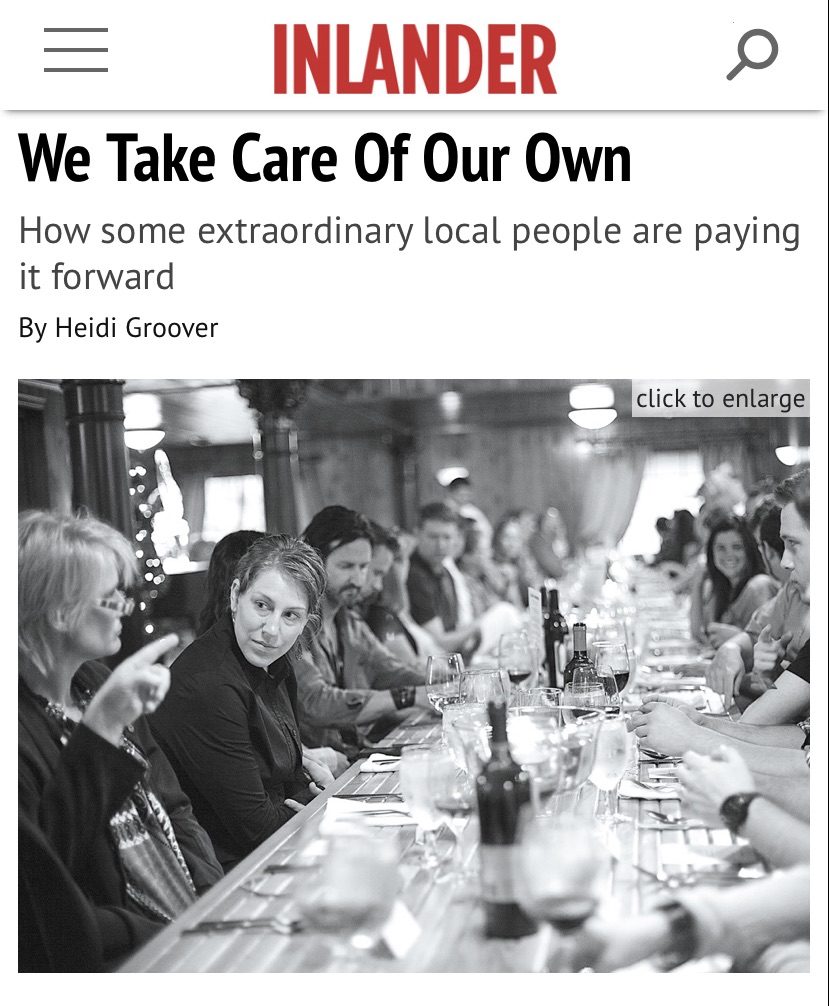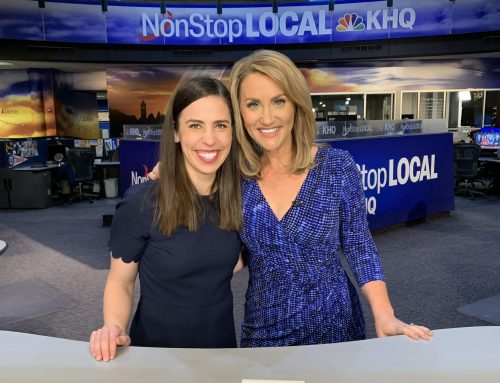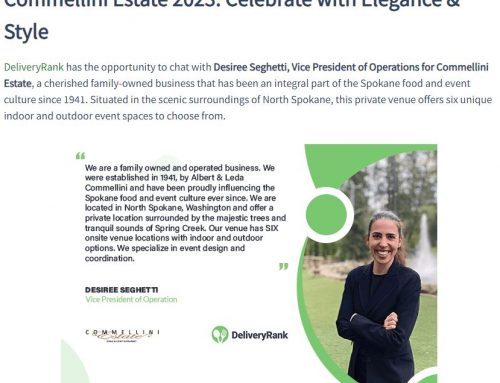Although Commellini Estate is only briefly mentioned in the below article, originally published by The Inlander, we are are including this on our Press page to bring awareness and acknowledgment to Big Table which is a local non-profit helping those in the restaurant and hospitality industry. Commellini Estate wholeheartedly believes in the mission and help Big Table provides and we encourage you to take a peek at how they are helping our local community.
See Original Article at The Inlander here.
We Take Care Of Our Own: How some extraordinary local people are paying it forward
“Nicole Eggers was running late.
The 30-year-old had recently left her job as a bartender and was speeding to a job interview with Commellini Estates, a special-event company that caters weddings and banquets. She was praying her red convertible would get her there OK.
Lately, so many things had been going wrong for her: Her marriage was crumbling and putting her kids in the car for daycare often meant letting them get rained on — the convertible’s top wouldn’t go up anymore. The car wouldn’t go in reverse either.
When she arrived at the interview, she whipped into a parking spot without thinking. She’d have to back out, but she couldn’t. After the interview, the well-dressed employees helped her push her car out of the spot so she could leave. She was humiliated.
A few days later, she got a call from Big Table. They’d heard about what had happened.
“We want to give you a car,” they said.
A few weeks later, she was driving a donated 1989 Toyota Camry.
“Everything was starting to unravel and the idea that there’s someone out there that cares, that’s never met me, but just genuinely wants to be helpful. That was a game changer,” she says. “It changed my perspective on what faces me. It gave me a new sense of hope to know there are people out there like that. We live in a good world.”
That’s what Big Table aims to do: Help people in the restaurant industry with their day-to-day struggles, hoping to help with something bigger along the way.
The group hosts 46-person dinners — yes, all at one big table — about every eight weeks. The guests are those who usually serve, cook or wash dishes, and the servers are those who usually dine — doctors, lawyers, businesspeople. Silverware and wine glasses clank, and diners enjoy meals prepared by some of the city’s best chefs.
Then, five courses in, with just dessert left, founder Kevin Finch stands before the crowd. “Who do you know that’s hurting?” he asks the group, and they leave their answers on notecards when they leave. They get requests for everything from new shoes to tax help. Sometimes they can meet the whole need; sometimes they can only start to help. Big Table volunteers have surprised people with laptops, clothing and baby supplies and offered help with energy bills, moving and landscaping.
Finch, a foodie and part-time restaurant reviewer, started the organization in 2009 by walking away from his job as a pastor.
In his exploration of local restaurants, he’d talk with foodies and chefs, sharing their passion for some new dish or dinner spot. Then he’d hear about the industry’s darker side. The hours are long and late, and most often when other people are enjoying dinner out or a holiday with their family, they’re working. The side effects, he learned, were often divorce, alcoholism or drug abuse.
Almost 13 million Americans are restaurant employees, making it one of the largest industries in the country, according to the National Restaurant Association. And it’s an industry with some of the highest rates of substance abuse, according to the U.S. Department of Health and Human Services.
“I said, ‘I just stumbled onto the toughest industry in the country.’ And the weird part was it didn’t seem like anyone else noticed,” Finch says. “Once I saw it, I couldn’t walk away.”
But if he told food friends he was a pastor, the conversation would almost always end soon after. They seemed afraid he would try to convert them. So, he quit to see if he could “serve these people without any strings attached.”
His group is a determined, but realistic one. They know they’ve got to be resourceful. They put together care packages with the help of donated goods or connections from people they know, and then deliver them as a surprise.
Sometimes, receiving a one-time gift is someone’s only involvement with Big Table. Other times, friendships will grow out of that gift. At its core, Big Table depends on the idea that if people help people — absent of any agenda or formal commitment — healthy relationships will flow naturally and people who need help will get it.
It’s working, Finch says, faster than he can keep up with. There’s a long waiting list to get into the dinners. The organization has a constant stream of care requests underway. People in cities like Seattle and Boise have asked him when he’ll come to them.
But he’s hesitant. Before it grows, he wants to know there are people as invested as he is — people who literally dream about it, like he did just the other night. (In the dream, he walked away mid-conversation with a car salesman to go talk to someone he overheard talking about Big Table. These types of things actually happen in Finch’s day-to-day, he says.)
“If we need to expand, we need to expand people first,” he says. “The need is always going to exceed the capacity to meet that need, so then you’re saying how do we effectively engage folks and get them involved? Part of the fun of what we do is it’s so basic — it’s meals and it’s caring for folks — that anyone can get involved.”
To get involved with Big Table, visit big-table.com or call 999-7429.
SECOND CHANCES
A gripping heroin addiction wasn’t enough. Neither was jail time, or the first time she heard Child Protective Services was going to take away her two daughters. It was hearing her oldest, Haley, call someone else “mom.”
Rachel Baker’s daughters were visiting her with the foster mom who was taking care of them as Baker bounced through rehab and relapse.
“She walked in and she goes, ‘Mom, there’s Rachel’ and I’m Rachel, and I’m like, ‘Wow,’” says Baker, 25, sweeping her straight blonde hair behind her ear and looking down at the floor. “It just broke my heart.”
Baker’s rap sheet includes drug charges and theft — “something like three felonies and nine misdemeanors,” she says — and most of her time in and out of jail is a haze today. But she remembers moments like that one with Haley. She remembers the nights at St. Margaret’s Shelter when, no matter what she did, she couldn’t comfort her younger daughter, Lillian, when she was crying.
“She didn’t know who I was. She was 2 months old when she was taken from me. She had no connection with me,” Baker says. “I try to remember that all the time so I can remember why I do what I do, because what I do is not easy.”
What Baker does now is work, go to college full time and care for her daughters.
After drug rehab at Isabella House, and a transition through St. Margaret’s, the family got their first house. But on moving day, they had nothing to put inside. Their first furniture came from the Spokane Community Warehouse, which works with local shelters and transitional housing to get low-income people furniture and housewares.
“When the drivers came and delivered it, it was just like Christmas,” she says. “To get a home and not have anything and just have someone say, ‘Here’s some stuff,’ it really makes a house a home.”
Today, on a stuffy July afternoon, Baker sits behind a desk answering phones and stapling paperwork. Now the manager of the Warehouse, she’s helping people who could be facing exactly what she faced, and she knows what it means to them. She says she’s seen some people burst into tears over getting a mattress, something most people take for granted.
“I have been in the same situation. … I came from that,” she says. “I can completely understand their frustrations, their joy and their excitement.”
Baker works full time overseeing the Warehouse and running its job-training program for participants whose situations, like jail time or homelessness, could make it hard to find a job. She’s studying social work at Spokane Falls; she’ll transfer to Whitworth in January to finish her degree. Her daughters are now 5 and 3, and they’re the most attached they’ve ever been, she says.
“St. Margaret’s and the Warehouse … they gave me a second chance and said, ‘Hey, let’s see what she can do’” she says. “Now I’ve really shown them that just because someone makes mistakes in their life doesn’t mean that they can’t get over them.”
To learn more about the Spokane Community Warehouse, visit spokanecommunitywarehouse.org. To donate furniture or volunteer, call 991-9345. To sponsor a family in need ($145 for a family’s complete furniture need or $30 to give a child a bed), call 624-9788.
WHERE DO YOU GO?
Michelle Christie’s home was a tent in her friend’s front yard when she started looking for help.
“I just started calling people — whoever I could think of,” says Christie, who lost the house she was renting after a lengthy hospital stay. “Where do you go? What do you do? How does this work?”
Christie had escaped a violent marriage and struggled through health problems related to severe obesity, but she’d never been homeless. She, her son and her daughter had nowhere to go, and she didn’t know where to start looking for resources she knew must exist for people in her situation. As she moved her family from the tent to the Interfaith Hospitality shelter (now Family Promise of Spokane) and finally into their own place, she found confidence. But she also found her future.
“It was just like this huge, awakening transformation for me to be able to know what’s out there,” says Christie, 43, who talks with her hands and, even though her voice sounds like she’s always just about to cry, smiles a lot. “If I couldn’t stand up and share my story and knowledge with others who need it, then I really was doing the community a disservice.”
Today, she’s oversees AmeriCorps volunteers at the Spokane Neighborhood Action Program (SNAP) and volunteers with food-rescue program Feed Spokane and the Voiceless Homeless Choir, an organization that provides weekly meals, singing and social time for homeless families.
Beyond day-to-day obligations, she sees her work as a way to spread a message for people like her.
“So many people think ‘homelessness’ and they think of the guy on the corner with the sign,” she says. “They don’t think of the families and the single moms, and really that’s just such a huge population right now.”
It’s people who’ve been there and moved on — people like Christie — who can bridge the gap between the homeless and the rest of the community, she says. She sees a future, even if it’s a distant one, where more people see that “everyone is just a paycheck or two away” from facing a situation like she did.
“I just hope that people start to really understand that just because somebody’s at their lowest level right now, they still deserve hope and respect and kindness.”







Leave A Comment